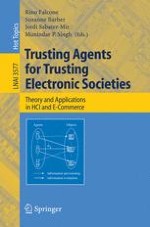Based on two international workshops on trust in agent societies, held at AAMAS 2003 and AAMAS 2004, this book draws together carefully revised papers on trust, reputation, and security in agent society. Besides workshop papers, several contributions from leading researchers in this interdisciplinary field were solicited to complete coverage of all relevant topics.
The 13 papers presented take into account issues from multiagent systems, artificial intelligence, cognitive science, game theory, and social and organizational science. Theoretical topics are addressed as well as applications in human-computer interaction and e-commerce.
